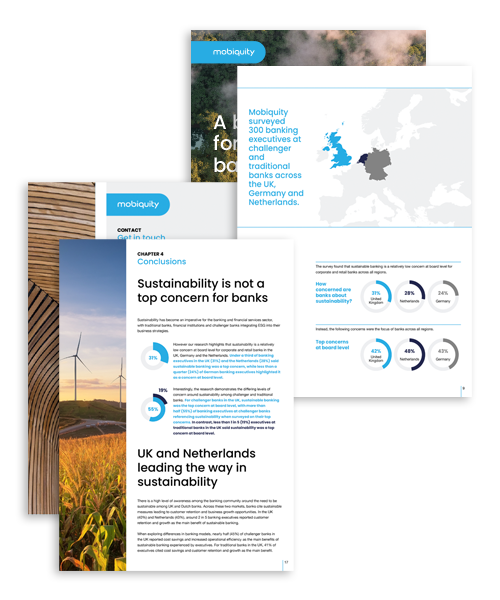Less than a third of banks in the UK (31%), Netherlands (28%) and Germany (24%) view sustainability as a top concern at board level
UK (78%) and Dutch (91%) banks leading the way in recognising sustainability as important part of the bank’s business strategy
Banks are paying lip service to becoming more environmentally sustainable: Under half of banks planning for sustainability initiatives across all regions
Banks believe that technology can make their operations greener: 80% of banking executives in the Netherlands and 72% of UK executives recognise the positive contribution digital can have to sustainability
Sustainable banking is not a boardroom priority for most European banks, according to new research.
 The research (of 300 banking executives in the UK, Germany and Netherlands), commissioned by Mobiquity and conducted by Censuswide reveals that less than a third of banks in the UK (31%), Netherlands (28%) and Germany (24%) believe that sustainability is a top concern for their business.
The research (of 300 banking executives in the UK, Germany and Netherlands), commissioned by Mobiquity and conducted by Censuswide reveals that less than a third of banks in the UK (31%), Netherlands (28%) and Germany (24%) believe that sustainability is a top concern for their business.
Surveying 300 banking executives at challenger and traditional banks across the UK, Germany and the Netherlands, the report found that UK and Dutch banks are leading the way in sustainable banking, with nearly all (91%) Dutch banking executives and three in four (78%) UK banking executives recognising the importance of sustainability as part of their company’s business strategy.
However, despite the high level of willingness among banks to engage with sustainability challenges, less than half of banking executives are planning sustainable measures as part of their business strategy in the UK (45%), Germany (40%) and the Netherlands (36%).
The main barriers cited by banking executives to adopting sustainable behaviours varied across regions. In the Netherlands, a third (33%) of banking executives reported lack of a cohesive ESG strategy as the main reason they are not being more sustainable. In the UK, the main barrier to adoption was COVID-19 and industry demands, which was reported by just under a third (31%) of banking executives. For German banks, little knowledge of the market and how to drive sustainability was the main barrier to the adoption of sustainability initiatives, with under a third (29%) of banking executives highlighting this area.
For those banks championing sustainable banking in the UK, the most common form of initiative is carbon credits – a scheme allowing a company to buy a permit to produce a certain amount of pollution and offset the pollution by paying for environmentally beneficial activities such as planting trees. In Germany and the Netherlands, banking executives reported using digital solutions to create sustainable outcomes as the common initiative being implemented.
The research suggests that there is a disconnect between bank public commitments to sustainability − including signing up to the UN Principle despite committing to UN Principles for Responsible Banking and promising to achieve “net zero” carbon emissions by 2050 or sooner – and their willingness to take action about sustainability.
The research may also reignite claims that banks are “greenwashing” – giving the impression that their businesses are more environmentally friendly than they are, while still financing fossil fuels such as coal, oil, and gas.
Commenting on the report, Dr Ben Caldecott, Director, Oxford Sustainable Finance Programme, University of Oxford and COP26 Strategy Advisor for Finance, UK Cabinet Office, said:
“Sustainable finance creates huge opportunities for the banking sector, and in addition to supporting clients transitions towards sustainability, banks will also need to become much more sustainable themselves, not only for their financed emissions, but for their own activities and operations.
“The banking sector is where the financial system and the real economy meets. It is in the interests of banks to move quickly given the scale of the opportunities and the risks that are already materialising. Banks need to develop comprehensive strategies, together with detailed plans for implementation tied to appropriate resourcing and levels of accountability to ensure implementation. For example, by enabling investments in digital capabilities, such as platforms that enable new forms of client engagement with sustainability and impact investing.
“Critically, it is also in their own commercial interests to do so and they should not wait for regulation or the enforcement of recently updated regulations.”
Matthew Williamson, VP of Global Financial Services, Mobiquity said:
“Our report shows that most UK banks are not doing enough to be sustainable. Not only will this have a large impact on the environment, but in the future, they will find that attracting customers and retaining talent will become difficult.
“Customers may decide to vote with their feet and investors may pressure banks to improve their performance on sustainability as it becomes a key business metric.
“Overall, the role of the bank in society is changing from a wealth repository to a digital lifestyle enabler. There is a golden opportunity therefore to build on existing awareness around digital and its role in creating sustainable banking outcomes, by embracing digital innovation that lays the foundation for achieving an eco-conscience across banking and financial services.”
This sustainable banking research was conducted by the independent market research company Censuswide, with 300 C-Suites at a mix of challenger and traditional banks in the UK, Germany and Netherlands between 30.03.21 – 12.04.21. Censuswide abide by and employ members of the Market Research Society which is based on the ESOMAR principles.
Leave your details below and we'll be in touch soon.
